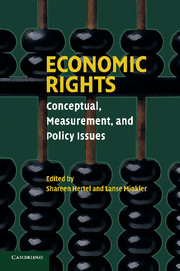Book contents
- Frontmatter
- Contents
- Contributors
- Acknowledgments
- 1 Economic Rights: The Terrain
- SECTION I CONCEPTS
- SECTION II MEASUREMENT
- 7 The Status of Efforts to Monitor Economic, Social, and Cultural Rights
- 8 Measuring the Progressive Realization of Economic and Social Rights
- 9 Economic Rights, Human Development Effort, and Institutions
- 10 Measuring Government Effort to Respect Economic and Social Human Rights: A Peer Benchmark
- 11 Government Respect for Women's Economic Rights: A Cross-National Analysis, 1981–2003
- SECTION III POLICY ISSUES
- APPENDIX 1 Universal Declaration of Human Rights
- APPENDIX 2 International Covenant on Economic, Social, and Cultural Rights
- Index
- References
7 - The Status of Efforts to Monitor Economic, Social, and Cultural Rights
Published online by Cambridge University Press: 18 December 2009
- Frontmatter
- Contents
- Contributors
- Acknowledgments
- 1 Economic Rights: The Terrain
- SECTION I CONCEPTS
- SECTION II MEASUREMENT
- 7 The Status of Efforts to Monitor Economic, Social, and Cultural Rights
- 8 Measuring the Progressive Realization of Economic and Social Rights
- 9 Economic Rights, Human Development Effort, and Institutions
- 10 Measuring Government Effort to Respect Economic and Social Human Rights: A Peer Benchmark
- 11 Government Respect for Women's Economic Rights: A Cross-National Analysis, 1981–2003
- SECTION III POLICY ISSUES
- APPENDIX 1 Universal Declaration of Human Rights
- APPENDIX 2 International Covenant on Economic, Social, and Cultural Rights
- Index
- References
Summary
INTRODUCTION
The requirements of article 2 of the International Covenant on Economic, Social and Cultural Rights (hitherto referred to as the ICESCR or the Covenant) have long complicated efforts to conceptualize and monitor economic, social, and cultural rights. Article 2(1) sets a standard of the gradual achievement of the enumerated rights in the Covenant within the framework of the resources available to do so. In other words, although the goal is the full implementation of the rights enumerated in the Covenant, states parties – the countries that have ratified the instrument – are not required to do so immediately. Instead, states parties are instructed as follows:
Each State Party to the present Covenant undertakes to take steps, individually and through international assistance and cooperation, especially economic and technical, to the maximum of its available resources, with a view to achieving progressively the full realization of the rights recognized in the present Covenant by all appropriate means, including particularly the adoption of legislative measures.
The standard specified by the ICESCR is often spoken of in a shorthand manner as “progressive realization.” The concept of progressive realization has been described as the “linchpin of the whole Covenant” (Alston & Quinn 1987, 172).
In contrast, the International Covenant on Civil and Political Rights (ICCPR) imposes an immediate obligation for states parties to respect and ensure all of its enumerated rights.
- Type
- Chapter
- Information
- Economic RightsConceptual, Measurement, and Policy Issues, pp. 143 - 164Publisher: Cambridge University PressPrint publication year: 2007
References
- 15
- Cited by



